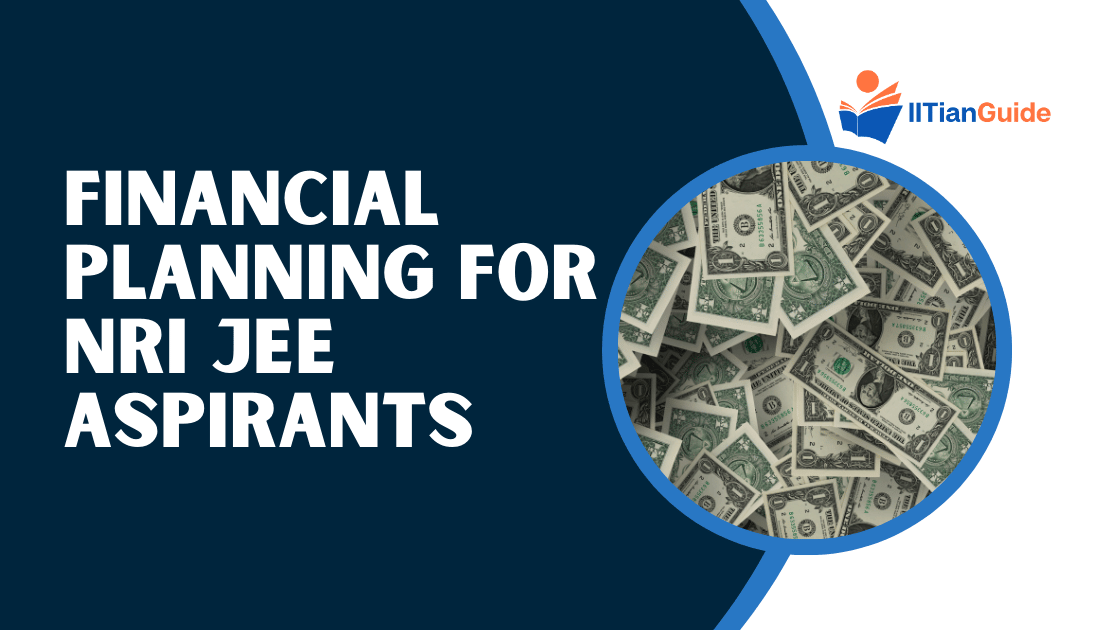Financial Planning for NRI JEE Aspirants: Smart Strategies for a Smooth Journey

Financial planning is crucial for NRI students aspiring to take the Joint Entrance Examination (JEE). The journey to securing a seat in the prestigious Indian Institutes of Technology (IITs) is challenging and costly. From tuition fees to travel expenses, there are numerous financial aspects that need careful consideration. Effective planning can ensure that this educational journey is smooth and financially manageable. Let’s explore some smart strategies for financial planning tailored for NRI JEE aspirants.
Financial Planning for NRI JEE Aspirants
- Tuition and coaching fees for NRI JEE aspirants can range from ₹200,000 to ₹500,000 annually. Planning for these costs early can help manage expenses effectively.
- Travel expenses, including airfare and local transportation, along with accommodation costs in cities like Kota and Hyderabad, can add up to ₹300,000 annually.
- Investing in SIPs regularly can help accumulate a substantial corpus over time, providing a disciplined approach to saving for education expenses.
- These secure investments offer guaranteed returns, making them an excellent option for long-term education funding with minimal risk.
- NRIs can avail of tax benefits on education loans. In India, Section 80E of the Income Tax Act allows for the deduction of interest on education loans, reducing the overall tax burden.
- These accounts help NRIs manage their finances efficiently. NRE accounts offer tax-free interest and full repatriability, while NRO accounts manage income earned in India with standard taxation.
- NRIs should be mindful of exchange rates and transaction fees. Using banks that offer competitive rates and lower fees can lead to substantial savings.
- DTAs prevent double taxation on the same income in two countries, optimising tax liabilities and supporting educational funding.
Understanding the Financial Landscape
Tuition and Coaching Fees
One of the primary costs for NRI JEE aspirants is tuition and coaching fees. Quality coaching is essential to crack the highly competitive JEE exam. Options vary, ranging from local coaching centres to online platforms. Some prestigious institutes and online platforms, such as IITianGuide, offer tailored courses for NRI students. Costs can vary significantly based on the duration and intensity of the courses. On average, the annual coaching fees can range from ₹200,000 to ₹500,000.
Travel and Accommodation Expenses
Travel and accommodation are significant considerations, especially if students opt to attend coaching classes in India. Travel expenses include airfare, local transportation, and possibly multiple trips back and forth. Accommodation costs depend on the city and type of lodging chosen. Cities like Kota and Hyderabad, known for their coaching centres, have a range of hostels and apartments. On average, annual accommodation expenses can be around ₹300,000.
Investment Strategies for Funding Education
Systematic Investment Plans (SIPs)
Systematic Investment Plans (SIPs) can be a disciplined way to save for education expenses. By investing a fixed amount regularly in mutual funds, parents can accumulate a substantial corpus over time. SIPs offer the benefit of market-linked returns, making them a preferred choice for long-term investment. HDFC Bank suggests that mutual funds are a wise investment for NRIs looking to grow their savings.
Fixed Deposits and Bonds
For those seeking stable and secure returns, fixed deposits and bonds are excellent options. These investments offer guaranteed returns and are relatively risk-free. ICICI Bank highlights that NRIs can invest in fixed deposits and bonds for steady growth with minimal risk. They provide a reliable source of income that can be earmarked for future education expenses.
Tax Planning and Benefits
Education Loan Benefits
Education loans offer significant tax benefits for NRIs. The interest paid on these loans can be deducted from taxable income, reducing the overall tax burden. According to Leap Finance, both India and the USA offer tax benefits on education loans. In India, Section 80E of the Income Tax Act allows for deduction of interest, which can result in substantial savings.
Utilising NRI-specific Tax Benefits
NRIs are eligible for specific tax benefits and incentives, such as double taxation agreements (DTAs) that prevent taxation on the same income in two countries. This can lead to significant savings and better financial management. Understanding and leveraging these agreements can optimise tax liabilities and support educational funding.
Banking and Financial Services for NRIs
NRE and NRO Accounts
Non-Resident External (NRE) and Non-Resident Ordinary (NRO) accounts are crucial for managing finances effectively. NRE accounts allow NRIs to park their overseas earnings in India with full repatriability and tax-free interest, while NRO accounts are used to manage income earned in India with standard taxation. These accounts facilitate efficient financial management and ensure funds are easily accessible when needed.
Foreign Exchange Management
Managing foreign exchange effectively is vital for minimising costs and maximising value. NRIs should be mindful of exchange rates and transaction fees. Using specialised services from banks like YES BANK that offer competitive rates and lower fees can lead to substantial savings over time. Planning transfers during favourable exchange rates can also enhance the value received.
Conclusion
Early and strategic financial planning is essential for NRI JEE aspirants. Understanding and preparing for various expenses, employing smart investment strategies, and utilising tax benefits can make the journey towards securing a place in the IITs smoother and financially viable. Parents and students should consider seeking professional financial advice tailored to their specific needs to ensure a well-planned and stress-free educational journey. The right financial strategies will pave the way for academic success without compromising financial stability.
Frequently Asked Questions (FAQs)
- Why is financial planning crucial for NRI JEE aspirants?
Financial planning is essential for NRI JEE aspirants because it helps manage the high costs associated with tuition, coaching, travel, and accommodation. Effective planning ensures that the educational journey is smooth and financially manageable, allowing students to focus on their studies without financial stress.
- What are the primary costs involved for NRI JEE aspirants?
The primary costs for NRI JEE aspirants include tuition and coaching fees, travel expenses, and accommodation costs. Quality coaching is essential to crack the competitive JEE exam, and these costs can add up significantly over time.
3. How much do tuition and coaching fees typically cost for NRI JEE aspirants?
Tuition and coaching fees for NRI JEE aspirants can vary significantly based on the duration and intensity of the courses. On average, annual coaching fees can range from ₹200,000 to ₹500,000.
4. What are the travel and accommodation expenses for NRI JEE aspirants attending coaching in India?
Travel expenses include airfare, local transportation, and possibly multiple trips between countries. Accommodation costs depend on the city and type of lodging chosen, with annual expenses averaging around ₹300,000.
- How can Systematic Investment Plans (SIPs) help in funding education for NRI JEE aspirants?
Systematic Investment Plans (SIPs) involve investing a fixed amount regularly in mutual funds, allowing parents to accumulate a substantial corpus over time. SIPs offer market-linked returns, making them a preferred choice for long-term educational savings.
- What are the benefits of fixed deposits and bonds for funding education?
Fixed deposits and bonds provide stable and secure returns, making them excellent options for those seeking guaranteed, risk-free investments. They offer a reliable source of income that can be earmarked for future education expenses.
- Are there any tax benefits for NRIs taking education loans?
Yes, NRIs can avail significant tax benefits on education loans. The interest paid on these loans can be deducted from taxable income, reducing the overall tax burden. In India, Section 80E of the Income Tax Act allows for the deduction of interest on education loans.
- What are NRE and NRO accounts, and how do they help in managing finances?
Non-Resident External (NRE) accounts allow NRIs to park their overseas earnings in India with full repatriability and tax-free interest, while Non-Resident Ordinary (NRO) accounts manage income earned in India with standard taxation. These accounts facilitate efficient financial management and ensure funds are easily accessible when needed.
- How can NRIs benefit from double taxation agreements (DTAs)?
Double taxation agreements (DTAs) prevent taxation on the same income in two countries, leading to significant savings and better financial management. Understanding and leveraging these agreements can optimise tax liabilities and support educational funding.
- What role does foreign exchange management play in financial planning for NRI JEE aspirants?
Effective foreign exchange management is crucial for minimising costs and maximising value. NRIs should be mindful of exchange rates and transaction fees, using specialised services that offer competitive rates and lower fees to achieve substantial savings.
- How early should NRIs start planning financially for their child’s JEE preparation?
Early financial planning is recommended to ensure sufficient time to accumulate funds and take advantage of investment growth. Starting as early as possible allows for a well-structured and stress-free financial strategy.
- Should NRIs seek professional financial advice for planning JEE expenses?
Yes, seeking professional financial advice tailored to specific needs can help ensure a comprehensive and effective financial plan. Professional advisors can provide insights into the best investment strategies, tax benefits, and financial management practices.

